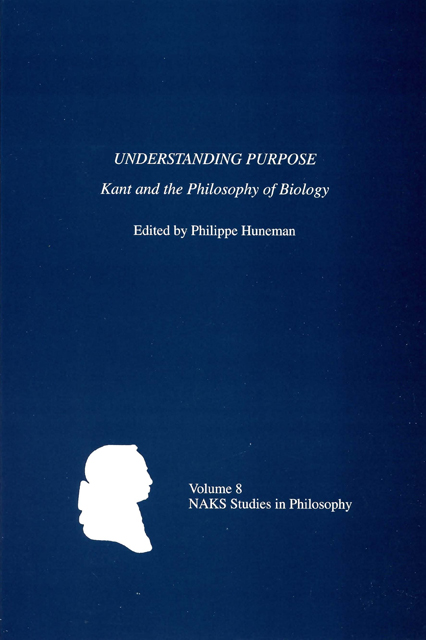Book contents
- Frontmatter
- Contents
- Acknowledgments
- Editor's Notes
- Introduction: Kant and Biology? A Quick Survey
- 1 Pre-Kantian Revival of Epigenesis: Caspar Friedrich Wolff's De formatione intestinorum (1768–69)
- 2 Kant's Persistent Ambivalence toward Epigenesis, 1764–90
- 3 Reflexive Judgment and Wolffian Embryology: Kant's Shift between the First and the Third Critiques
- 4 Kant's Explanatory Natural History: Generation and Classification of Organisms in Kant's Natural Philosophy
- 5 Succession of Functions and Classifications in Post-Kantian Naturphilosophie around 1800
- 6 Goethe's Use of Kant in the Erotics of Nature
- 7 Kant and British Bioscience
- Bibliography
- Contributors
- Index
6 - Goethe's Use of Kant in the Erotics of Nature
Published online by Cambridge University Press: 10 March 2023
- Frontmatter
- Contents
- Acknowledgments
- Editor's Notes
- Introduction: Kant and Biology? A Quick Survey
- 1 Pre-Kantian Revival of Epigenesis: Caspar Friedrich Wolff's De formatione intestinorum (1768–69)
- 2 Kant's Persistent Ambivalence toward Epigenesis, 1764–90
- 3 Reflexive Judgment and Wolffian Embryology: Kant's Shift between the First and the Third Critiques
- 4 Kant's Explanatory Natural History: Generation and Classification of Organisms in Kant's Natural Philosophy
- 5 Succession of Functions and Classifications in Post-Kantian Naturphilosophie around 1800
- 6 Goethe's Use of Kant in the Erotics of Nature
- 7 Kant and British Bioscience
- Bibliography
- Contributors
- Index
Summary
Abstract
Though it might provoke a throat seizure to pronounce the adjectives “erotic” and “Kantian” in the same breath, these terms best describe the bichambered heart of Goethe's morphological theory. While traveling in Italy in 1786–88, Goethe underwent transforming personal experiences that provided a deeply felt appreciation of the human form. He supposed that such appreciation depended on certain ideal structures; indeed, he even thought of these ideal structures as nature's creative instruments. Shortly after he returned to Weimar, he began a study of Kant's First Critique; and in 1790, he read the Third Critique. He resisted the fi rst, but fell in love with the third. Kant's notions of an archetype and an archetypus intellectus provided just the theoretical structures to support his erotic inclinations; but under the tutelage of Schelling, he gave these Kantian regulative ideas a determinative use.
Introduction
By the end of July 1786, Johann Wolfgang von Goethe (1749–1832) had become mentally exhausted. His duties as civil administrator to the dukedom of Carl August (1757–1828) of Saxe-Weimar-Eisenach occupied increasing amounts of time. His relationship with Charlotte von Stein (1742–1827), a sexually enticing woman of considerable intellectual agility, had dissolved into a tame companionship that emphasized for Goethe his decline into domesticity.
Ten years before, when the fi ery young author of Leiden des jungen Werthers (“Sorrows of Young Werther,” 1774) had arrived in Weimar to serve as companion to the young prince, all seemed possible. He composed plays and acted in them, carried on fl irtations, and then worried about the repair of roads and the fl ooding of the silver mines of Illmenau, all with equal energy—the kind of energy that fueled his reckless infatuation with von Stein, hardly to be deterred by her husband and three children. But those days had passed.
During the middle part of the 1780s, he had been working on a semi-autobiographical novel, which like many of his other artistic projects lay as a conceptus interruptus.
- Type
- Chapter
- Information
- Understanding PurposeKant and the Philosophy of Biology, pp. 137 - 148Publisher: Boydell & BrewerPrint publication year: 2007



